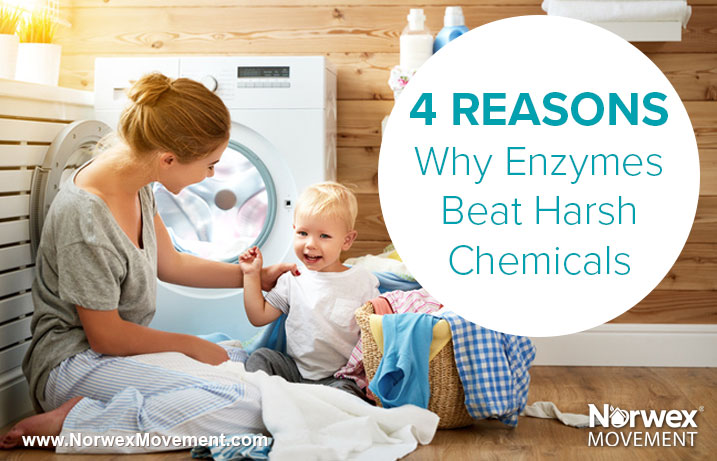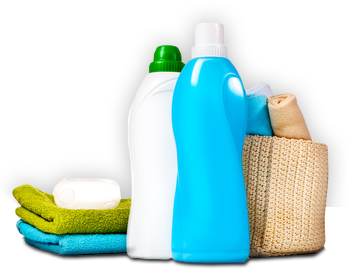

Today it seems like you hear the word “enzyme-based” in lots of different applications. From oven cleaners to carpet stain removers, enzyme biotechnology is now a part of everyday life. Enzymes are everywhere! But what are enzymes, exactly, and what makes them so special?
First of all, enzymes really are everywhere—and they have been for quite some time. Enzymes are natural. All living organisms produce these proteins, which function as a catalyst to help control metabolism and growth. Enzymes control the rate of certain chemical reactions and help these and other processes to occur more efficiently.
Enzymes are very useful ingredients, particularly in cleaning and laundry products that aim to be Earth-friendly as well as effective. Here’s why:
In laundry detergents, enzymes help remove stains and odors, increase whiteness, eliminate fabric pills and help prevent resoiling. Enzymes in the formula also allow for shorter wash cycles and lower water temperatures. The result? Clean, fresh laundry and energy savings too!
The introduction of enzymes into the formulas of cleaning and laundry products has been a significant game-changer. Now fewer harsh chemicals are necessary, such as lye or sodium hydroxide, so your family and the environment stay safer. This is especially good news as it relates to getting your clothes, towels and sheets their cleanest—since all of these items come into frequent contact with your skin!
Here’s a quick look at some enzyme groups and their specific areas of stain-fighting expertise.
Proteases break down protein stains, like grass, egg, blood, coffee, tea, dairy, wine and fat, as well as odors.
Amylases help break down starch-based stains, like those from pasta and potato dishes, and cereals.
Lipases accelerate the breakdown of fatty and oily stains. They help remove body stains on cuffs and collars, as well as stains from lipstick, butter, gravy, vegetable oils and other non-mineral oils and fats.
Cellulases help maintain brightness by reducing pilling and fuzzing that can trap dirt. In other words they help your whites and brights stay that way.
Mannanases break down food stains caused by thickening agents like guar gum and locust bean gum.
Pectinases disintegrate stains from fresh fruits and berries, as well as processed foods, tomato-based foods and sauces, jelly, and more.

*Modern enzymes are mass-produced through the fermentation of various fungi and bacteria.
Bacillus subtilis, for example, is a carrier bacteria for various blends of enzyme production. Found in soil, water, air and decomposing plant matter, Bacillus subtilis is considered a benign organism as it does not possess traits that cause disease. It’s not considered pathogenic or toxigenic to humans, animals or plants.
Resources:
I am so excited about the New Norwex Liquid Laundry Detergent. Enzyme based is a wonderful perk! Thank you for giving us such wonderful products to help us help families and the environment at the same time!!
Thank you for this! I love having the information to share when I talk about how much I love my enzyme cleaners. 😀
This is very interesting. I have not tried the Liquid Laundry Detergent, but will definitely ask my rep about it.
I LOVE cleaning with enzymes, I tell everyone about what a world of difference it makes! SO HAPPY to have Norwex to help me achieve my green living goals!
Thank you for the feedback, Gingi! We love helping people create safer havens for their families!
Can someone please confirm if the enzymes are plant or animal sourced? I have a child allergic to mammal so it’s critical that we only use plant based enzymes in our home.
Jeanette, thank you for your inquiry about Norwex products. Norwex Movement is a separate division of Norwex that exists to help people create safer havens in their homes by raising awareness about planetary issues that affect us all. Our policy is to direct all Norwex-specific inquiries to Customer Care. In the U.S., please contact 1-866-450-7499. In Canada, please contact 1-877-766-7939.
In Australia, the number to call for product inquiries/clarification is: 07 3204 9444.
This is a great source of information about enzymes and how they are effective. Thank you 🙂
Toxic is toxic. Low or not. Chemicals are chemicals, harsh or not so harsh.
thanks for the information and advice 🙂
I learned so much! Thank you.